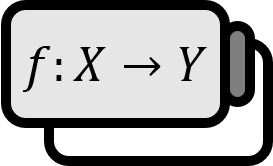Recursive Relations of Legendre Polynomials
Theorem
$$ P_{l}(x)=\dfrac{1}{2^l l!} \dfrac{d^l}{dx^l}(x^2-1)^l \tag{1} $$
Such a Legendre Polynomial $P_{l}$ satisfies the following recursive relation:
$$ P^{\prime}_{l+1}(x)-P^{\prime}_{l-1}(x)=(2l+1)P_{l}(x) \tag{a} $$
$$ lP_{l}(x)=(2l-1)xP_{l-1}(x)-(l-1)P_{l-2}(x) \tag{b} $$
$$ xP^{\prime}_{l}(x)-P^{\prime}_{l-1}(x)=lP_{l}(x)\tag{c} $$
Proof
$(a)$
First, if we calculate the derivative of $P_{l}(x)$,
$$ \begin{align*} \frac{d}{dx}P_{l}(x) &= \frac{1}{2^l l!}\frac{d}{dx} \dfrac{d^l}{dx^l}(x^2-1)^l \\ &= \frac{1}{ 2^{l}l! }\frac{ d ^{l} }{ dx^{l} }\frac{d}{dx}(x^{2}-1)^{l} \\ &= \frac{2l}{ 2^{l}l! }\frac{ d ^{l} }{ dx^{l} }\left[ x(x^{2}-1)^{l-1} \right] \\ &= \frac{1}{ 2^{l-1}(l-1)! }\frac{ d ^{l-1} }{ dx^{l-1} }\left[ (x^{2}-1)^{l-1}+2(l-1)x^{2}(x^{2}-1)^{l-2} \right] \\ &= \frac{1}{ 2^{l-1}(l-1)! }\frac{ d ^{l-1} }{ dx^{l-1} }[(x^{2}-1)+2lx^{2}-2x^{2}] (x^{2}-1)^{l-2} \\ &= \frac{1}{ 2^{l-1}(l-1)! }\frac{ d ^{l-1} }{ dx^{l-1} }[(2l-1)x^{2}-1] (x^{2}-1)^{l-2} \end{align*} $$
and substitute $l+1$ for $l$,
$$ P^{\prime}_{l+1}(x)=\frac{1}{2l!}\frac{ d ^{l} }{ dx^{l} }[(2l+1)x^{2}-1] (x^{2} -1 )^{l-1} \tag{2} $$
Then, substitute $l$ with $l-1$ into $(1)$ and differentiate,
$$ \begin{align*} P^{\prime}_{l-1}(x) &= \frac{1}{2^{l-1}(l-1)!}\frac{d}{dx} \frac{ d^{l-1} }{ d x^{l-1} }(x^{2}-1)^{l-1} \\ &= \frac{2l}{2^{l}l!}\frac{ d^{l} }{ dx^{l} }(x^{2}-1)^{l-1} \tag{3} \end{align*} $$
Now, calculating $(2)-(3)$,
$$ \begin{align*} P^{\prime}_{l+1}(x)-P^{\prime}_{l-1}(x) &= \frac{1}{2l!}\frac{ d ^{l} }{ dx^{l} }[(2l+1)x^{2}-1] (x^{2}-1)^{l-1} -\frac{2l}{2^{l}l!}\frac{ d^{l} }{ dx^{l} }(x^{2}-1)^{l-1} \\ &= \frac{1}{2^{l}l!}\frac{ d ^{l} }{ d x^{l} }[(2l+1)x^{2}-(2l+1)] (x^{2}-1)^{l-1} \\ &= \frac{1}{2^{l}l!}\frac{ d ^{l} }{ d x^{l} }(2l+1)(x^{2}-1)^{l} \\ &= \frac{2l+1}{2^{l}l!}\frac{ d ^{l} }{ d x^{l} }(x^{2}-1)^{l} \end{align*} $$
Due to $(1)$, the right side is the same as $(2l+1)P_{l}(x)$, hence
$$ P^{\prime}_{l+1}(x)-P^{\prime}_{l-1}(x)=(2l+1)P_{l}(x) $$
■
$(b)$
Generating Function of Legendre Polynomials
The function $\Phi (x,h)$ below is called the generating function of Legendre Polynomials.
$$ \Phi (x,h)=\frac{1}{\sqrt{1-2xh+h^{2}}},\quad |h|<1 $$
The generating function satisfies the following equation:
$$ \Phi (x,h)=P_{0}(x)+hP_{1}(x)+h^{2}P_{2}(x)+\cdots =\sum \limits_{l=0}^{\infty}h^{l}P_{l}(x) $$
Part 2. Proof of Recursive Relation
First, differentiate $\Phi (x,t)$ with respect to $t$, $$ \begin{align*} && \frac{ \partial \Phi}{ \partial t } &= -\frac{1}{2}(-2x+2t)(1-2xt+t^{2})^{-\frac{3}{2}} \\ \implies && (1-2xt+t^{2})\frac{ \partial \Phi}{ \partial t} &= (x-t)\Phi \end{align*} $$
Then, substitute $\Phi (x,t)=\sum \limits_{l=0}^{\infty}t^{l}P_{l}(x)$ into the above equation,
$$ (1-2xt+t^{2})\sum \limits _{l=1}^{\infty}lt^{l-1}P_{l}(x)=(x-t)\sum\limits_{l=0}^{\infty}t^{l}P_{l}(x) $$
Aligning the indices,
$$ (1-2xt+t^{2})\sum \limits _{l=0}^{\infty}(l+1)t^{l}P_{l+1}(x)=(x-t)\sum\limits_{l=0}^{\infty}t^{l}P_{l}(x) $$
This equation is an identity with respect to $t$, so the coefficients of $t^{l}$ on both sides must be the same. Comparing the coefficients of $t^{l}$,
$$ 1 [(l+1)t^{l}P_{l+1}(x)] -2xt[(l)t^{l-1}P_{l}(x)]+t^{2}[(l-1)t^{l-2}P_{l-1}(x)]=x [t^{l}P_{l}(x)]-t[t^{l-1}P_{l-1}(x)] $$
$$ \implies (l+1)t^{l}P_{l+1}(x) -2xlt^{l}P_{l}(x)+(l-1)t^{l}P_{l-1}(x)=x t^{l}P_{l}(x)-t^{l}P_{l-1}(x) $$
$$ \implies (l+1)P_{l+1}(x) -2xlP_{l}(x)+(l-1)P_{l-1}(x)=x P_{l}(x)-P_{l-1}(x) $$
Here, if we substitute $l-1$ for $l$,
$$ lP_{l}(x) -2x(l-1)P_{l-1}(x)+(l-2)P_{l-2}(x)=x P_{l-1}(x)-P_{l-2}(x) $$
And rearrange the left side with respect to $P_{l}(x)$,
$$ lP_{l}(x) =(2l-1)x P_{l-1}(x)-(l-1)P_{l-2}(x) $$
■
■
$(c)$
It is easy to verify that the generating function satisfies the following:
$$ (x-h)\frac{ \partial \Phi}{ \partial x }=h\frac{ \partial \Phi}{ \partial h } $$
Now, substituting the series form $\Phi (x,h)=\sum\limits_{l=0}^{\infty}h^{l}P_{l}(x)$ of the generating function,
$$ (x-h)\sum\limits_{l=0}^{\infty}h^{l}P^{\prime}_{l}(x)=h\sum\limits_{l=1}^{\infty}lh^{l-1}P_{l}(x) $$
The above equation is an identity with respect to $h$, hence the coefficients of $h^{l}$ on both sides must be the same. Comparing the $h^{l}$ terms of both sides,
$$ \begin{align*} && x[h^{l}P^{\prime}_{l}(x)]-h[h^{l-1}P^{\prime}_{l-1}(x)] = h[lh^{l-1}P_{l}(x)] \\ \implies && h^{l}[xP^{\prime}_{l}(x)-P^{\prime}_{l-1}(x)] = h^{l}lP_{l}(x) \\ \implies && xP^{\prime}_{l}(x)-P^{\prime}_{l-1}(x) = lP_{l}(x) \end{align*} $$
■
